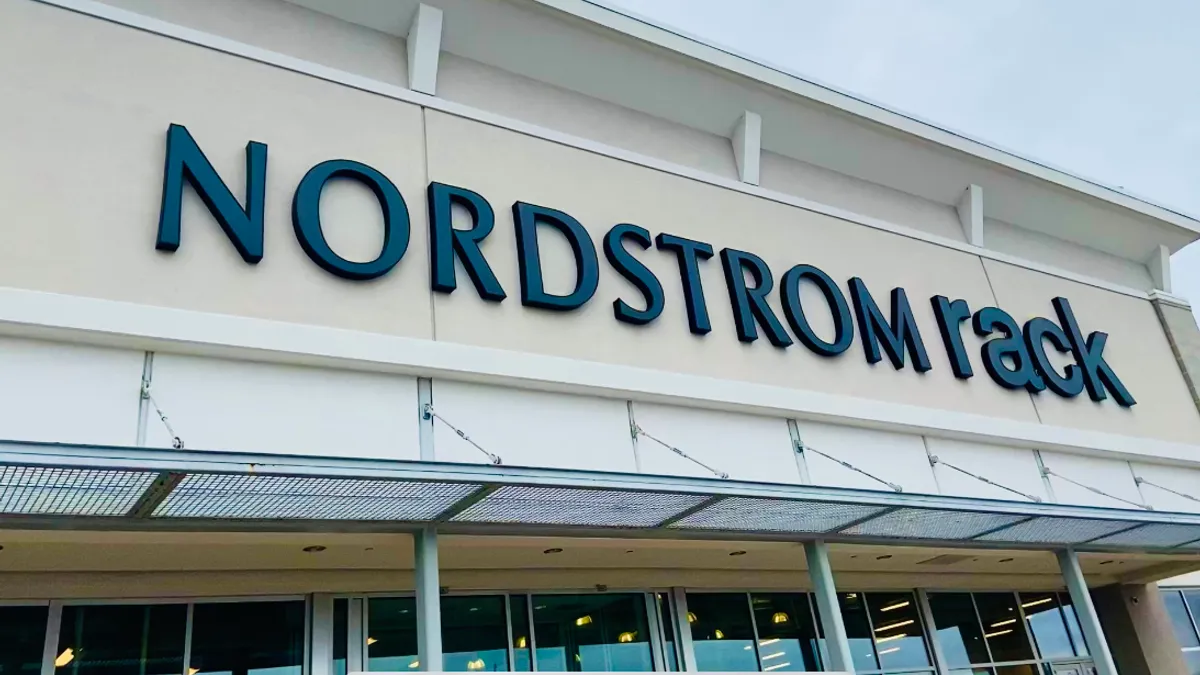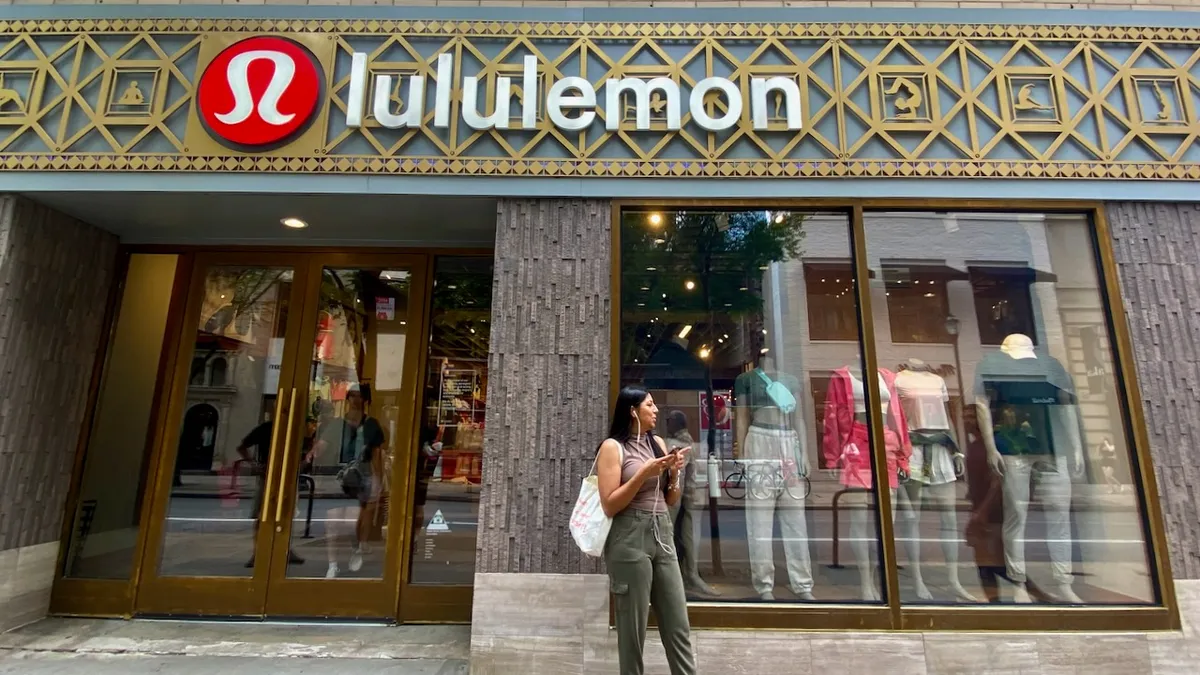CHICAGO — Digital native brand Eloquii occupies a fast-growing niche in retail: plus-size apparel. Approximately 67% of the U.S. population is considered plus sized and the $21 billion market is growing at twice the rate of the "straight-size" market, according to Mariah Chase, Eloquii's CEO. Close to 20% of total apparel spending is done in the category.
"It's a huge opportunity that we're trying to attack by serving up fashion in an underserved market," Chase told attendees at the IRCE conference in Chicago Thursday during a keynote address.
The brand was originally created in 2011 as part of the Limited and quickly killed. It relaunched in 2014 after the assets were acquired the previous year. Eloquii is largely an e-commerce business, but has begun opening stores — there are four today and fifth is slated open later this month in Houston.
Chase attributed this growth to a combination of data and design in her remarks at IRCE. Once upon a time in fashion, the power rested with the brand architects — the designers, merchants and marketers who made decisions — and consumers bought, or didn't. That has changed. "The customer now has all the power," Chase said. "The internet has upended consumption patterns."
It is also allowing brands to approach design, merchandising and marketing with new tools.
Eloquii is using the internet to test items before they go into production, to gauge shopper interest and avoid inventory errors. The brand can post a picture of an item and offer it for pre-sale. Customers sign up to be put on a waitlist and then get a notice when the product is available, giving Eloquii a near precise estimate of demand, down to the size assortment.
"Within 24 to 48 hours after putting something up like this, we know if [it] is going to be good, average or a problem child," she said. "This allows us to mitigate risk on an item that has the potential for a lot of volatility."
For example, a strapless rainbow colored dress with fringe could be a real risk for a retailer, but was a hit in the preview stage. "This is not a black pant," said Chase. "[But] this dress was a hit. Mind you, we have not sold a single unit of this. But we know this is going to be a winner and we'll sell out."
Eloquii has also started to test dynamic pricing. Chase believes that the system, largely in use today by airlines and hotels where prices fluctuate greatly based on supply and demand, is also the future of retail. The question is, Chase said, "If something is really good, scarce and in short supply, will she pay more?"
The short answer is yes, she said. The retailer has been testing this for about a year and has seen incremental margin growth on items that are dynamically priced throughout their life cycle. The program is powered entirely on machine learning and algorithms.
Data is also driving Eloquii's marketing today. "Data powers targeting, recognition and adoption of a brand's belief system," she said.
And all of this has lead to stores, and brick and mortar's power to provide higher sales and better information about Eloquii's core customer, one that has long been underserved. "We're the new kids on the block, we have a long way to go and a lot to learn," she said.
Stores are also being used to mine data from customers as filtered through both machines and the store associates who provide feedback.
"When we first launched, investors would ask me if we were ever going to open stores," reminisced Chase. "I said, 'no way! We're in the digital swim lane.' Then our customers started asking for it."
Today, Eloquii's brick and mortar customers are its most profitable, thanks in part to associates who double as stylists and began booking appointments with shoppers for styling sessions. These customers have a basket size four times bigger than average and accounted for a double-digit percentage of store growth, according to Chase.
When the Houston store opens later this month, the brand will also launch an omnichannel styling program that will allow for the harvesting of shopper's info and data in a new way. "I'm curious to see how in the future, stores can become more of a source for data — in two to three years, when retailers have smart dressing rooms," said Chase, who believes RFID will probably be table stakes, funneling more data back from stores.
And in keeping with a host of digitally native brands, she also believes that stores are the key to her brand's success. "We support the cliché that your omni customer is the best customer by 3X," she said. "This is our most profitable bucket of customers and we need to go find more of her."
This notion of "brick mining" isn't Eloquii's only. Fabletics President and General Manager Gregg Throgmartin told IRCE attendees last year that a need for data led the company to begin opening stores, detailing the new and growing practice of "brick mining."
Nor is Eloquii alone in pursuing the plus-size shopper. Former Gilt Groupe executives recently launched CoEdition, an e-commerce site featuring plus-size apparel from a variety of designers — an assortment that continues to grow as more brands extend into the range. Retailers from department stores to mass are pursuing the shopper with new designer partnerships and merchandising initiatives.
It's not enough to simply stock extended sizes and Eloquii's strategy is to offer work appropriate and fashion-forward styles that are on trend, but not too edgy, explained Chase. And being true to this brand is part of her formula for success, especially to earn the loyalty of today's younger shoppers.
"Fifty percent of millennials don't believe in any sort of religion," said Chase, citing a 2012 study. "Brands have the opportunity to [create] a community and stand in for belief systems. Businesses centered around ideals grow faster, [those] that stand for something are more profitable."
"We can talk about [whether this is true] all day long, but is that the reason we have more customers? I think it really has to do with our belief system that resonates with our customers," she said. "We believe in fashion. We believe in its transformative power. That is our belief system and that is our brand, and we think ultimately what has driven a little bit of success."




















